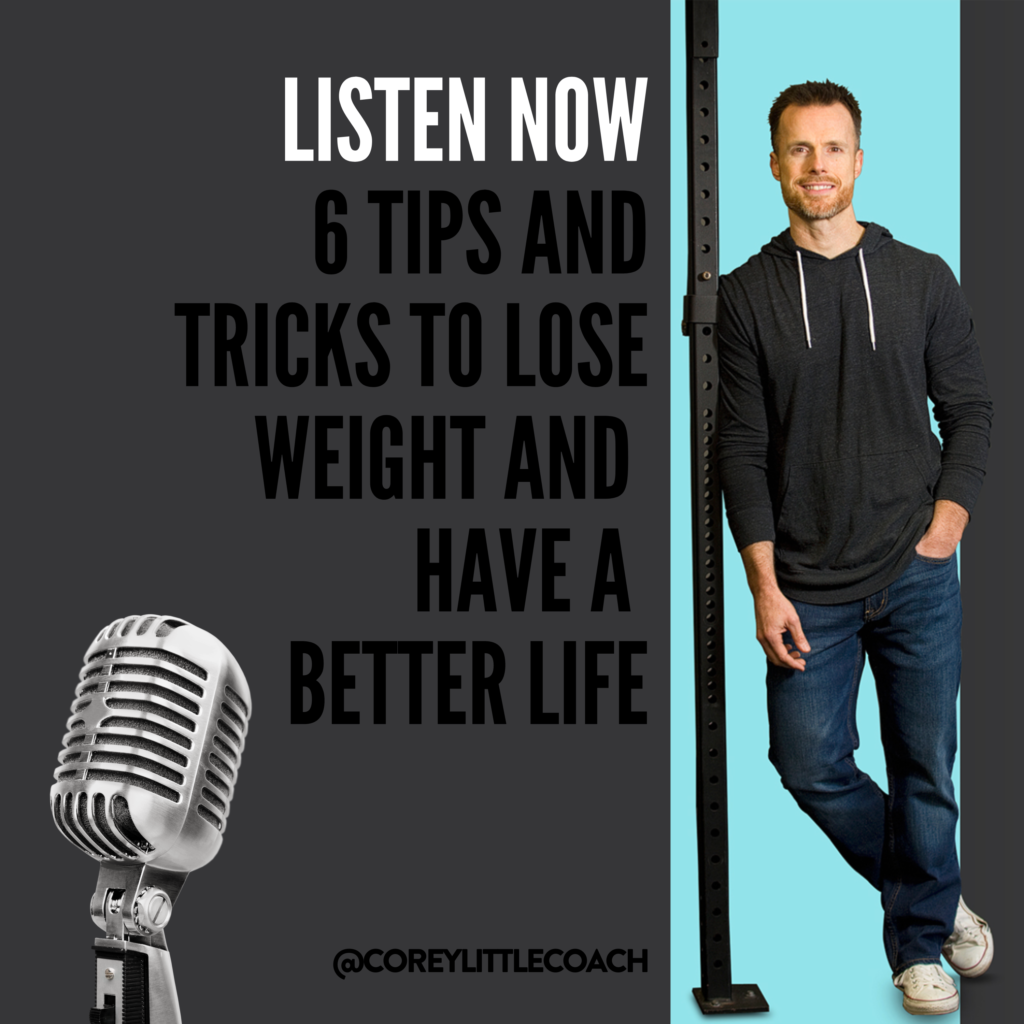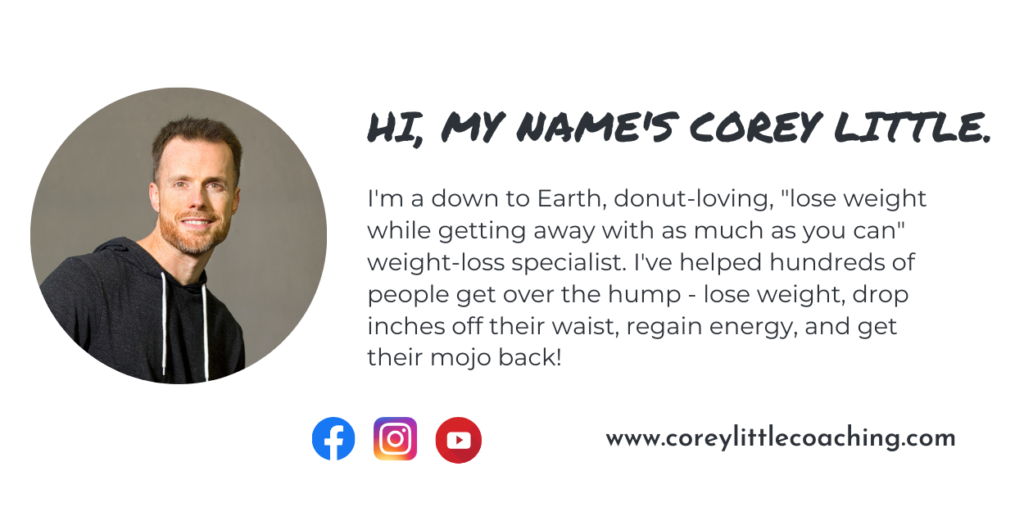
Listen on Spotify | Listen on Apple Podcast | Listen on Stitcher
In this post, we are going to discuss 6 tips and tricks that might help you lose weight, or more importantly, help you to have a better quality of life. These 6 things are a compilation of conversations I have had over the years, questions people have asked me, and notes I have jotted down whenever I have one of those “aha” or light bulb moments. I hope that these tips help improve your mental health a little bit or even just provide some insight and create an “aha” moment for you wherever you are in your journey. Let’s jump in!
6 Tips and Tricks to Lose Weight and Have a Better Life
Tip #1: Narrow Your Focus
One of the most important skills for success is your ability to focus, specifically, your ability to narrow your focus and execute. It’s extremely hard to execute, take action, and do it consistently. If you can’t narrow your focus, then making progress is going to be really tough. If we’re going to make progress in some area that we’ve struggled with in the past, we have to be able to narrow our focus and cut through the hard stuff of life. A helpful way to think of it is this: you can either be a laser or a floodlight. A laser is very narrow, right? They are usually small and powerful. Floodlights on the other hand are helpful but not super effective. They’re spread out and they’re really kind of weak. When you think of your energy, your life force, if you can narrow your focus down, you can be like a laser and execute and make progress.
Tip #2: Be Intentional
When you really think about life, there are five basic categories: career, family, spiritual life, friends, and health, both physical and mental. It is crucial for us to be intentional about these aspects of life, and to balance them appropriately. Neglecting any one of these areas can result in negative consequences in the long term of our life. It’s common for us to neglect certain aspects of our life when we are so focused on other parts. But when we do that, we lose our intentionality and balance. Think about a garden. If you neglect one part and put all your focus on another, the neglected part with suffer and not grow. Being intentional and focusing on each area will result in a beautiful and fruitful garden. The same goes for our life, but it requires effort and attention. Remember, you cannot maximize every area of your life all the time, but you can at least maintain most areas while pursuing growth and progression in one or two specific areas.
Tip #3: Watch out For Streaks
Now I know a lot of people are big fans of creating streaks in their life, but I believe that streaks can be dangerous! While pursuing a perfect streak like working out 5 days a week or spending 15 minutes a day reading can be motivating, it can also lead to all-or-nothing thinking and perfectionism. Instead of obsessing over streaks, it’s better to focus on imperfect consistency, aka striving for consistency in a behavior rather than a perfect streak. Pursuing a consistent action can lead to better results in the long term. Breaking a streak intentionally can be helpful to avoid all-or-nothing thinking and celebrate the importance of rest. So, instead of getting drunk on streaks, let’s strive for consistency and enjoy the process!
Tip #4: Just Because We Are Capable of Doing Something, Doesn’t Mean We Should Do It.
Tip number four is about the idea that just because we are capable of doing something, it doesn’t necessarily mean we should do it. The word “should” can often bring up negative emotions, but in this case, it helps to make the point. There are all kinds of physical challenges and workout plans that circulate online. Things like running 1000 miles in a year or even 2023 miles in a year for some people. While this may seem exciting, it’s important to ask ourselves if it’s really what’s best for us and if it aligns with our goals. Sometimes we seek a sense of accomplishment at the expense of our own health or end up injuring ourselves. A lot of people who set these goals end up dealing with injuries like stress fractures or pain in their hips. While it may be fun to post about these goals on social media, it’s important to consider if they will truly help us move in the right direction and toward what we want in life. Instead of just doing something because we can, we should consider if it’s really worth it and if it will ultimately benefit us.
Tip #5: Don’t Let Food Play Too Big or Too Little of a Role in Your Life
Food can play too big or too small of a role in your life. When food becomes an obsession and takes up too much of your attention, it can lead to disordered eating or a low quality of life where you’re constantly analyzing everything you eat. On the other hand, if you rely too heavily on food for pleasure or joy, it can also be problematic. Neither extreme is healthy. If food plays too small of a role in your life, it can lead to weight gain and declining health. Finding a healthy balance with your food is key to a happy and healthy life. People who have long-term success with weight loss and overall health find that sweet spot where they pay attention to what they eat without obsessing over it. They allow food to be a part of their life, but not the main focus. Consider asking yourself what role food is playing in your life, and if it’s a healthy balanced one or not.
Tip #6: Develop Real-Time Emotional Regulation
Real-time emotional regulation is one of the most important and helpful skills anyone can possess. Emotional regulation refers to a person’s ability to effectively manage and respond to an emotional experience. Strategies for emotional regulation are used unconsciously by people to cope with difficult situations many times throughout each day. Without good emotional regulation, people tend to handle negative emotions in unhealthy ways. This could be binge eating or drinking alcohol, which in turn can affect their ability to focus on their goals.
Emotional regulation in real time means understanding our emotions, learning to manage and regulate them, and learning what’s behind them. Emotions don’t just happen; they are triggered by the stories we tell ourselves about what has happened. Once we recognize that there is a thought and a story in the gap between the event and the emotion, we gain incredible insight and can better manage our emotions. If we don’t learn real-time emotional regulation, we risk getting caught up in “emotional tornadoes” and losing focus on our goals. However, mastering this skill not only leads to peace and contentment in life but also better mental and physical health, allowing us to focus and make progress toward our goals in all areas of life!
Recap: Six Tips and Tricks to Lose Weight and Have a Better Life
Let’s recap! First and foremost, it’s crucial to narrow your focus and execute to achieve your goals. Second, consider being intentional with your resources to get the most out of life, career, family, spirituality, friends, and physical and mental health. Third, avoid streaks that may lead to perfectionism and strive for consistency instead. Fourth, remember that just because you could do something, it doesn’t mean you should. Especially if it comes at the expense of other important areas of your life like your health. Fifth, food can play a big or small role in your life, and finding a healthy balance is key. Finally, emotional regulation is a crucial tool for processing and dealing with emotions.
If you found any of these points helpful, feel free to share them with others, and reach out to me if you have any questions or want to hear more! Remember, there’s more to you than just a number. With dedication and focus, you can achieve a better quality of life!

